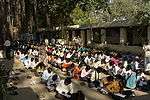North-Eastern Hill University
North-Eastern Hill University (NEHU), is a Central University established on 19 July 1973 by an Act of the Indian Parliament. The university is in the suburb of Shillong, the state capital of Meghalaya, India. The university has two campuses: Shillong and Tura in Meghalaya. NEHU Tura Campus functions under a pro-vice chancellor.[1]
 | |
| Motto | Rise Up and Build |
|---|---|
| Type | Public |
| Established | 1973 |
| Vice-Chancellor | S.K. Srivastava |
| Location | , , 793022 , 25°36′36″N 91°54′5″E |
| Campus | Suburban |
| Nickname | NEHU |
| Affiliations | UGC, NAAC, AIU, AICTE |
| Website | www |
It is the University Grants Commission's University with Potential for Excellence (conferred in 2006). It was established as a regional university for the states of northeast India, including Meghalaya, Nagaland, Arunachal Pradesh and Mizoram, and had given birth to Nagaland University in 1994 and Mizoram University in 2001.[2]
Administration
The head of the administration is the vice-chancellor (VC), who is appointed by the visitor of the university, the President of India, for a five-year tenure. The Governor of Meghalaya is the chief rector. Under the VC are two pro-vice-chancellors, one for each of the two campuses, Tura and Shillong, and a Registrar.[3] As of April 2018, the VC is S.K. Srivastava.[4]
Initially, the academic departments and the administration of NEHU at Shillong functioned from three prime sites in the Shillong city; one from the former Maharaja of Mayurbhanj, the other from the Rani of Bijni and the third one from the Government of Meghalaya, popularly known as Horse-Shoe Building. The university now runs its central administration from its main campus in Mawkynroh-Umshing.[2]
Campus
NEHU has two academic campuses, one at Mawkynroh-Umshing, Shillong, and another at Chandmari, Tura. Shillong is the headquarters of academic and administrative functions. The main campus is 1225 acres in area. It accommodates National Council of Science Museums (NCSM), Indira Gandhi National Open University (IGNOU), Indian Council of Social Science Research (ICSSR), Sports Authority of India (SAI) and The English and Foreign Languages University (EFLU).[5]
Library
The Central Library started in 1973 with a collection of 600 books. Its membership includes university and college teachers, postgraduate and undergraduate honours students and members of the non-teaching staff. The permanent library at Shiilong campus was funded by the Indian Ministry of Development of North Eastern Region (MDoNER) and inaugurated in 2006. It now has a collection of over 230,000 books, 38,000 bound periodicals and it subscribes to 316 foreign and 366 Indian journals.[6]
Schools
The university has the following schools, departments and centres of studies:[7]
- School of Economics, Management etc.
- Agri-Business Management and Food Technology (Tura)
- Commerce Department
- Economics Department
- Journalism and Mass Communication
- Library & Information Science department
- Management Department (Tura)
- Tourism and Hotel Management Department
- School of Education
- Adult and Continuing Education Department
- Centre for Distance Education
- Centre for Science Education
- Education Department
- Education Department, Tura Campus
- School of Human & Environmental Sciences
- Anthropology Department
- Environmental Studies Department
- Geography Department
- Horticulture Department
- Rural Development and Agricultural Production
- School of Humanities
- English Department
- English Department (Tura Campus)
- Garo Department (Tura Campus)
- Hindi Department
- Khasi Department
- Linguistics Department
- Philosophy Department
- School of Life Sciences
- Biochemistry Department
- Biotechnology & Bioinformatics Department
- Botany Department
- Zoology Department
- School of Physical Sciences
- Chemistry Department
- Mathematics Department
- Physics Department
- Statistics Department
- School of Social Sciences
- Cultural & Creative Studies Department
- History & Archaeology Department, Tura Campus
- History Department
- Law Department
- Political Science Department
- Sociology Department
- School of Technology(SOT)
- Architecture Department
- Basic Sciences & Social Sciences Department
- Biomedical Engineering Department
- Computer Applications Department
- Electronics and Communication
- Energy Engineering Department
- Information Technology Department
- Nanotechnology Department
Jurisdictions and affiliated colleges
The jurisdiction of the university extended originally to the states of Meghalaya and Nagaland and the erstwhile Union Territories of Arunachal Pradesh and Mizoram. With the establishment of the Nagaland University on 6 September 1994, the jurisdiction of NEHU ceased over Nagaland. Likewise with the establishment of the Mizoram University the jurisdiction of NEHU over Mizoram also ceased from June 2001. Arunachal Pradesh has its own university.
Rankings
| University rankings | |
|---|---|
| General – India | |
| NIRF (Overall) (2020)[8] | 74 |
| NIRF (Universities) (2020)[9] | 49 |
The National Institutional Ranking Framework (NIRF) ranked North-Eastern Hill University 74th overall in India[8] and 49th among universities[9] in 2020.
References
- Suba TB (ed) (2012). North-Eastern Hill University: Thirty-eight Annual Report 2011-2012 (PDF). NEHU. p. v-vi. Archived from the original (PDF) on 12 February 2018. Retrieved 30 July 2013.CS1 maint: extra text: authors list (link)
- NEHU (2013). Prospectus (PDF). North Eastern Hill University. pp. 1–6.
- "Officials". nehu.ac.in. North-Eastern Hill University, Shillong. Retrieved 12 April 2018.
- "The Vice-Chancellor". nehu.ac.in. North-Eastern Hill University, Shillong. Retrieved 12 April 2018.
- Press Information Bureau (6 January 2006). "The Host University of Indian Science Congress: NEHU". dst.gov.in. Department of Science and Technology. Archived from the original on 2 February 2013. Retrieved 30 July 2013.
- NEHU Library. "Library". nehu.ac.in. Retrieved 30 July 2013.
- "Schools of study". nehu.ac.in. Retrieved 12 April 2018.
- "National Institutional Ranking Framework 2020 (Overall)". National Institutional Ranking Framework. Ministry of Human Resource Development. 11 June 2020.
- "National Institutional Ranking Framework 2020 (Universities)". National Institutional Ranking Framework. Ministry of Human Resource Development. 11 June 2020.
